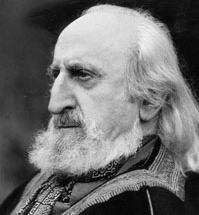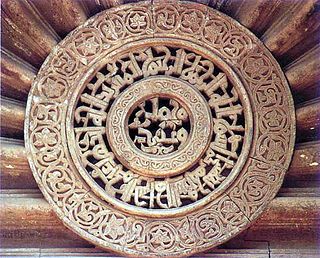Related Research Articles

Seyyed Hossein Nasr is an Iranian philosopher and University Professor of Islamic studies at George Washington University.

Frithjof Schuon was a Swiss metaphysician of German descent, belonging to the Perennialist or Traditionalist School of thought. He was the author of more than twenty works in French on metaphysics, spirituality, the religious phenomenon, anthropology and art, which have been translated into English and many other languages. He was also a painter and a poet.

Welayah or Walaya is a general concept of the Islamic faith and a key word in Shia Islam that refers, among other things, to the nature and function of the Imamate.

Haal or ḥāl is a special-purpose, temporary state of consciousness, generally understood to be the product of a Sufi's spiritual practices while on his way toward God.

Ecotheology is a form of constructive theology that focuses on the interrelationships of religion and nature, particularly in the light of environmental concerns. Ecotheology generally starts from the premise that a relationship exists between human religious/spiritual worldviews and the degradation or restoration and preservation of nature. It explores the interaction between ecological values, such as sustainability, and the human domination of nature. The movement has produced numerous religious-environmental projects around the world.
Resacralization is the process of reviving religion or restoring spiritual meanings to various domains of life and thought. It has been termed as the "alter ego" of secularization, which is "a theory claiming that religion loses its holds in modern society". The term rescralization has a variety of connotations in sociology of religion and "very largely draws its meaning" from secularization thesis. According to this viewpoint, religion and spiritual values continue to play an important role in both the private and public realms. Empirical evidence suggests that the world is undergoing a rescralization since religions are gaining ground in contemporary social and political spheres.

Kurt Almqvist (1912–2001) was a Swedish poet, intellectual and spiritual figure, representative of the Traditionalist School and the Perennial philosophy.
Gisela Goodrich Webb is an American scholar of comparative religion and professor emerita of religious studies at Seton Hall University in South Orange, New Jersey. Her works mainly focus on the intellectual and mystical traditions of Islam, Muslim women's rights and Islam in America.
In traditionalist philosophy, desacralization of knowledge or secularization of knowledge is the process of separation of knowledge from its divine source—God or the Ultimate Reality. The process reflects a paradigm shift in modern conception of knowledge in that it has rejected divine revelations as well as the idea of spiritual and metaphysical foundations of knowledge, confining knowledge to empirical domain and reason alone. Although it is a recurrent theme among the writers of the Traditionalist school that began with René Guénon, a French mystic and intellectual who earlier spoke of "the limitation of knowledge to its lowest order", the process of desacralization of knowledge was most notably surveyed, chronicled and conceptualized by the Iranian philosopher Seyyed Hossein Nasr in his 1981 Gifford Lectures that were later published as Knowledge and the Sacred.
Caner Dagli is a Circassian-American Islamic scholar and associate professor of Religious Studies at the College of the Holy Cross in Worcester, Massachusetts.
Knowledge and the Sacred is a 1981 book by the Iranian philosopher Seyyed Hossein Nasr. It was originally presented as his Gifford Lectures, which he delivered in 1981. The book is an exposition of perennial philosophy and has been described as a summa of the traditional perspective. It reflects Nasr's desire to revive what he refers to as the sacred quality of knowledge as opposed to knowledge based on sense perception and reason.
Islamic environmentalism is a strand of environmental philosophy as well as an Islamic movement that employs environmental principles derived from Islamic scriptures and traditions to the environment and the modern-day environmental crisis. Muslim environmentalists believe in God's absolute sovereignty over nature and emphasize humanity's role as God's vicegerent, making it their duty to protect and preserve the environment. Islamic environmentalism encompasses Islamic ecological philosophy, Sharia-based environmental law, and Islamic environmental activism.
In perennial philosophy, scientia sacra or sacred science is a form of sacred knowledge that lies at the heart of both divine revelations and traditional sciences. It recognizes sources of knowledge other than those recognized by modern epistemology, such as divine revelations and intellectual intuition, the latter of which is considered a supra-rational form of knowledge based on the human intellect. Scientia sacra embodies principles and doctrines derived from reason, revelation and intellectual intuition, with the conviction that these sources of knowledge can be reconciled without conflict in a hierarchical order and employed in the human quest to understand different orders of reality. It views the universe as a unified reality centered on God—the Ultimate Reality—whose knowledge is beyond the reach of sense perception and reason. This notion may be traced back to traditional cultures and civilizations, particularly Islamic tradition, which was primarily conceptualized in contemporary language by the Iranian philosopher Seyyed Hossein Nasr in his book Knowledge and the Sacred, originally published in 1981, containing his Gifford Lectures delivered that same year.
In perennial philosophy, tradition means divinely ordained truths or principles revealed or unveiled to mankind, and refers to their implications and applications in different areas of human life and thought. Traditionalists employ the term to refer to immutable principles—the sophia perennis or primordial wisdom—that are rooted in the divine source, as opposed to the term "modern," or "modernity," which is divorced and disconnected from the reality of God or the Absolute Truth. The term "tradition" is also used synonymously with revelation, and it encompasses all forms of philosophy, art, and culture that are influenced by it. Although the term has been used in relation to perennial philosophy since René Guénon, and was further developed by his adherents, including Ananda Coomaraswamy and Frithjof Schuon, it was most notably conceptualized by the Iranian philosopher Seyyed Hossein Nasr, who credited Guénon for his idea of tradition.
In traditionalist philosophy, pontifical man is a divine representative who serves as a bridge between heaven and earth. Promethean man, on the other hand, sees himself as an earthly being who has rebelled against God and has no knowledge of his origins or purposes. This concept was notably developed in contemporary language by the Iranian philosopher Seyyed Hossein Nasr.
Resacralization of nature is a term used in environmental philosophy to describe the process of restoring the sacred quality of nature. The primary assumption is that nature has a sanctified aspect that has become lost in modern times as a result of the secularization of contemporary worldviews. These secular worldviews are said to be directly responsible for the spiritual crisis in "modern man", which has ultimately resulted in the current environmental degradation. This perspective emphasizes the significance of changing human perceptions of nature through the incorporation of various religious principles and values that connect nature with the divine. The Iranian philosopher Seyyed Hossein Nasr first conceptualized the theme of resacralization of nature in contemporary language, which was later expounded upon by a number of theologians and philosophers including Alister McGrath, Sallie McFague and Rosemary Radford Ruether.
In traditionalist philosophy, resacralization of knowledge is the reverse of the process of secularization of knowledge. The central premise is that knowledge is intimately connected to its divine source—God or the Ultimate Reality—which has been severed in modern times. The process of resacralization of knowledge seeks to reinstate the role of intellect above and beyond that of reason, as well as to revive the role of traditional metaphysics in acquiring knowledge—especially knowledge of God—by drawing on sacred traditions and sacred science that uphold divine revelations and the spiritual or gnostic teachings of all revealed religions. Iranian philosopher Seyyed Hossein Nasr elaborated on the process of resacralization of knowledge in his book Knowledge and the Sacred, which was presented as Gifford Lectures in 1981.
Religion and the Order of Nature is a 1996 book by the Iranian philosopher Seyyed Hossein Nasr.
An Introduction to Islamic Cosmological Doctrines is a 1964 book by the Iranian philosopher Seyyed Hossein Nasr.
Ideals and Realities of Islam is a 1966 book by the Iranian philosopher Seyyed Hossein Nasr.
References
- ↑ Mascall 1970, pp. 103–104.
- ↑ Pringle 1968, p. 1.
- ↑ O'More 1970, p. 58.
- ↑ van Ess 1969, p. 246.
- ↑ Riepe 1969, p. 301.